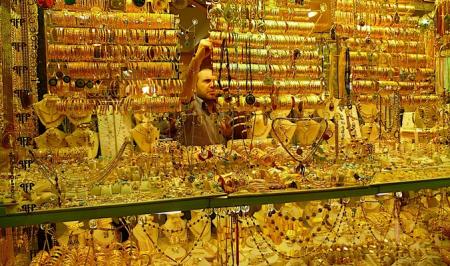Gold changes the equation: profits for the central bank, losses for the middle class, and a disaster for Iraqi families.
 The global gold market has been witnessing a rapid upward trend since the beginning of 2025, driven by geopolitical tensions and declining confidence in financial markets, making the yellow metal the primary safe haven for capital. Iraq, for its part, is being affected by this trend in two contradictory ways: the first is positive for the Central Bank’s official reserves, and the second is negative for the local market, where the price of a mithqal has jumped to 765,000 dinars, an unprecedented figure that reflects a deepening social and economic crisis, according to modern political approaches.
The global gold market has been witnessing a rapid upward trend since the beginning of 2025, driven by geopolitical tensions and declining confidence in financial markets, making the yellow metal the primary safe haven for capital. Iraq, for its part, is being affected by this trend in two contradictory ways: the first is positive for the Central Bank’s official reserves, and the second is negative for the local market, where the price of a mithqal has jumped to 765,000 dinars, an unprecedented figure that reflects a deepening social and economic crisis, according to modern political approaches.
Economic researcher Nasser Al-Kanani explained that “gold prices are expected to continue rising in the coming period, driven by a number of international factors, most notably geopolitical tensions, declining confidence in global financial markets, and increased demand for gold as a safe haven amid fears of a global economic slowdown.” This reading is consistent with data from the World Gold Council, which confirmed that gold demand in the first half of 2025 reached its highest level in a decade, directly impacting local prices, according to legal readings.
Al-Kanani explained that “these developments will have direct and indirect repercussions for Iraq and the world, as Iraq will benefit from the increase in its gold reserves and the increase in their market value, which will enhance the stability of the currency and support the Central Bank’s cash reserves.” This point is pivotal; the Central Bank announced in early 2025 that Iraq possesses more than 132 tons of gold, ranking 30th globally. The record-high price means billions of dollars in book gains added to the official reserve, which helps support the dinar relatively in the face of international pressure on the dollar. Specialized economists confirm that this increase gives Iraq greater scope for monetary maneuvering.
But the other side of the crisis is emerging locally. Al-Kanani warned that “the local market may face pressure on the prices of locally traded gold, increasing the costs of marriage and popular savings linked to gold.” This observation has become a reality. With the price of a mithqal reaching 765,000 dinars, dowry costs have risen by 30–40% compared to last year. Furthermore, families’ ability to traditionally save through gold has declined, shocking large segments of society who have traditionally relied on it as a safe haven within Iraqi homes. Social researchers believe that these increases portend a social crisis that will place a new burden on young people and increase the rate of reluctance to marry.
Al-Kanani also noted that “continued global growth will lead to a reshaping of capital flows, as investors turn to gold at the expense of other assets, which could put pressure on some financial markets. We also expect prices to remain volatile but tend to rise as long as international conditions remain unstable.” This scenario opens the door to greater shifts in the Iraqi economy, as increased demand for gold could lead to an outflow of liquidity from the local market in favor of purchasing the metal, exacerbating inflationary pressures on basic commodities. Regulatory data indicates that domestic demand for gold increased by 25% in 2025 compared to last year, reflecting the fragility of alternative investment instruments in Iraq.
The data clearly show that the rise in gold has placed Iraq in a dual equation: stronger central reserves and a more stable monetary environment on the one hand, and stifling social and economic pressures on consumers on the other. Al-Kanani’s statements clearly reflected this duality, linking institutional gains to daily societal losses. The future depends on Iraq’s ability to invest gains to bolster its reserves and diversify its economic instruments, in parallel with measures to ease the burden on households, such as alternative savings programs or domestic price control policies. Without this, the rise in gold prices will remain a gain for the government and a huge loss for society, a prospect considered by independent research as the most serious challenge to the balance of economic and social justice.
Burathanews.com
